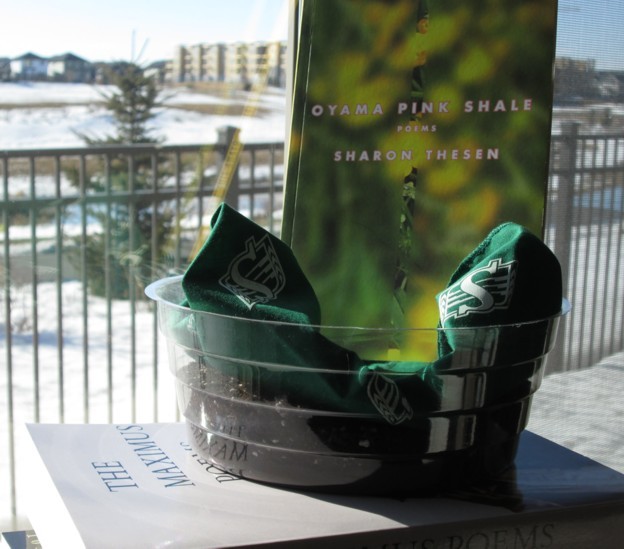
Geomantic riposte: 'Oyama Pink Shale'

Born in Tisdale, Saskatchewan, and currently an inhabitant of the Okanagan “wild” in Kelowna BC, and self-identified in the company of poet George Stanley as a staunch “aboutist,” Sharon Thesen is indeed a literary rara avis whose score of witty, entertaining and insightful poetry books are balanced by solid editorial and academic contributions, including two editions of The New Long Poem Anthology, a Governor-General’s Award-winning edition of Phyllis Webb’s poetry (The Vision Tree), and with co-editor Ralph Maud, two books of correspondences between the poet Charles Olson and book designer Frances Boldereff — the most recent being After Completion: The Later Letters of Charles Olson and Frances Boldereff. Amid many laurels, her collection A Pair of Scissors won the Pat Lowther Memorial Award, and The Good Bacteria was a finalist for the Governor-General’s Award, the ReLit Award, and the Dorothy Livesay Prize.
In an interview with poet Daphne Marlatt for The Capilano Review, Thesen offered the following about her approach to poetry:
I like to write, and read, a poetry that engages what Gary Snyder calls “the wild.” Wildness and sanity are the two sources, and outcomes, of poetry that I trust, respect, read, love, and would like to write. That “wild” I conceive of as sanity. Sanity is a rare and under-appreciated condition, usually and mistakenly allied with repression. Whereas I believe sanity is the social and psychological equivalent of what Snyder calls “the wild”: as Snyder says, “interconnected, interdependent, incredibly complex. Diverse, ancient, and full of information.” Snyder says a poem is a “creature of the wild mind.” By “wild” and “sane” I mean elegant, complex, subtle, and clear as a bell even as it must muddy the waters of the given.
The restless movements of Thesen’s poems, to be found in her latest collection Oyama Pink Shale, by turns delightfully self-conscious or welcome in the company of ‘thingness’, whether hung up on negative capability or strung out on apophatic experimentation, leaves the reader at once fired up with what Sappho calls “magnificent gusts” and yet strangely, mirthfully becalmed, until you get restless all over again. In short, whenever I reread this book, she blows up my Ripple Rock every time! Forgive me, that's a sorry attempt at Kwakwaka'wakw conquest humour.
Oyama Pink Shale by Sharon Thesen (House of Anansi Press, 2011, Page 25)
It’s as quiet as the skin on a custard.
Gardeners clip and prune and feed.
Gladiolas’ leek-like straight strong stalks
a reproach. The consumptives —
delicate, sensitive — victims of cities,
bad air, bad drains, bad
fiction, hard lives, a lack
of sunshine and morals.
Geomantic Riposte: Constraint
Winter’s bright in this sanitorium of a city where on public holidays uniformity is
sometimes broken by sledding In his unauthorized biography Beethoven
damned our whole system of ethics but at the ThinkCentre conference those in
the know advised a round of auto-flagellation during office hours We laid down
Lowry’s good fiction and pried back the teeth of the CONSTRAINT wanting
not to wreck our Sunday best or enjoy ourselves more than our Protocol nether-
wear could stand it You know, culturally, I never thought I’d think back fondly
of Camille Paglia on the Bob Costas show I’m still palely loitering in the public
square like Detlev Spinell waiting for the sublime Sehnsuchtsmotiv to kick in and
we did not enjoy a moral victory that day but after the basement full of winners
and right after the Bach, driving back through the valley when the Lully kicked in